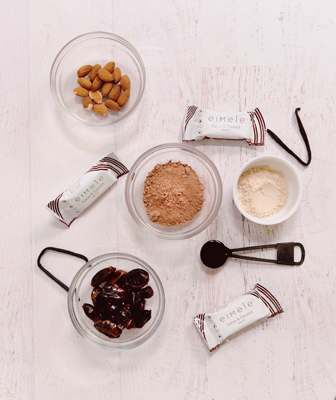Simon Hill Veganism Interview

Veganism - What You Need To Know
Social media has been in a frenzy following the launch of Netflix doco "The Game Changers", with consumers jumping on the bandwagon and switching to vegan diets overnight.
While adopting a vegan diet may seem easy – removing meat, dairy or any other animal product – vegan alternatives aren't always the healthiest options, often filled with hidden chemicals and other nasties.
Interview with Simon Hill, Qualified Health Professional and Founder of Plant Proof
Question: What originally inspired your passion for Plant-Based Nutrition?
Simon Hill: Originally I made the connection between my food choices and my personal health. I discovered science that clearly shows a reduction in animal products can reduce your risk of cardiovascular disease - the leading cause of death in Australia and most other Western countries. Given my Dad and Grandfather both had heart attacks I was quite motivated to change my lifestyle in whatever way I could to reduce the chance of a similar event happening to me. In no time I was surprised by just how easy it was to change my diet and rather than missing the animal products I had left behind, my eyes were opened to a whole new world of flavours and ingredients I previously had been missing out on. It didn't take long to then learn more about planetary health & animal welfare, and specifically how our diet effects both of these. There are no healthy humans without a healthy planet and when it comes to animal welfare, it feels good to no longer support industries that inflict a lot of unnecessary pain and suffering.
Question: Can you share your thoughts on The Game Changers documentary?
Simon Hill: The Documentary has brought an important issue to the surface. As a society we are very much obsessed with animal products. We recognise meat, and other animal products, as protein, strength and status. While the Game Changers, like most documentaries, takes a one sided view on the topic, it's definitely moving people in the right direction. There is more than enough evidence to suggest a plant-predominant or plant-exclusive diet is optimal for human health and at the same time is better for our environment and reduces the amount of pain & suffering felt by other sentient beings (cows, sheep, pigs etc). Above all, the documentary shows that you can enjoy these benefits whilst performing at an elite level. That's a pretty powerful message if you ask me. I've of course seen a lot of the online commentary about the film: some positive and some negative. Personally I wish the conversation was more about connection and working together, omnivores and vegans, to create a better world. We need this connection if we want to shift the needle. Unfortunately, I must say, from what I have read it has been rather divisive - particularly on social media.
Question: What do people need to know about switching to a vegan diet?
Simon Hill: By adopting a vegan diet you are choosing to no longer consume animal foods but remember, veganism is not synonymous with health. There are many ways to cut a vegan diet. It could be full of processed vegan food, a mixture of processed vegan food and some whole plant foods, or predominately whole plant foods. What way you do a vegan diet depends on why you are passionate about being vegan and what's important to you. Some people are not so interested in their personal health, while others are. At the end of the day veganism is an ethic. It means causing as little harm to sentient beings as humanely possible. In contrast, someone may adopt a plant-based diet without the same degree of ethical consideration, and perhaps not consider themselves a vegan. This is very personal and up to each individual.
Personally, because I come from a Nutrition background, I recommend that everyone who adopts a vegan diet does it in a healthful manner. After all, your personal health is paramount to your message and activism.
Question: What advice do you have someone newly adopting a vegan diet?
Simon Hill: Don't focus too much on the label. Make the transition at whatever pace works best for you. That may be 1 vegan meal a day and then slowly progressing to two a day and so forth. Or it may be overnight - it really depends on your personality and individual circumstances. As you are introducing more plant-based meals be conscious of calorie density. Most plant based foods are less calorie dense than animal based ones so in order to consume adequate energy you need to eat great volume (fill the plate up more). Finally, don't be scared of fruit or carbohydrates. Carbohydrates and sugar from fruit making us fat is a huge myth. Your weight is controlled by your overall energy balance (calories consumed minus your daily energy expenditure), not a particular macronutrient. What we do know is that the more whole plant foods you eat, the less likely you are to over consume calories - this is what makes a whole food plant based diet great for losing weight without counting calories.
Above all, make sure you do a lot of reading. Changing to a vegan diet means unlearning a lot of information instilled in us from society. Find good sources of information online and books so that you can be confident with the changes that you make in order to set yourself for success.
Question: Why are vegan alternatives not always the healthiest options?
Simon Hill: Vegan alternatives can often contain a lot of artificial ingredients & refined sugars. If you are going to buy packaged vegan products look for one's that contain whole food ingredients such as the Eimele porridges, soups and snack bars. Although my message is to eat as many whole foods in their original form, not all packaged products are unhealthy, and of course I understand that they are very convenient for people that are time poor. Eimele is a perfect example of a brand producing conveniently packaged plant based products from health promoting ingredients.
 Question: How can those choosing a plant based diet choose the most nutritious options?
Question: How can those choosing a plant based diet choose the most nutritious options? Simon Hill: Aim for most of your calories to come from whole plant foods in their unprocessed or minimally processed form. Whilst there are a bunch of innovative processed vegan foods popping up in the market, most of the time these are loaded with salt and sugar and are therefore best limited to the odd occasion. Beyond getting enough calories from predominately whole plant foods, there are some nutrients of focus (something all dietary frameworks have) I recommend people plan their diet around. These include Iodine, Vitamin B12, Vitamin D, Zinc and DHA/EPA essential fatty acids - I have created a Plant Proof healthy vegan food pyramid that includes the food groups I recommend people focus on, and my supplement recommendations as some of these nutrients of focus are a little more difficult to get when you remove animal products from your diet. The main supplement I recommend is a blend of B12, D3 and DHA/EPA by Nutrikynd.
Question: What five ingredients can you not live without?
Simon Hill: Chickpeas (to make hummus)
Bananas (I'm good for at least 2 per day)
Blueberries (antioxidant powerhouses and super tasty fresh or frozen)
Tempeh (rich in protein and takes on your favourite herb and spice flavourings)
Question: What is Plant Proof?
Simon Hill: Plant Proof is a resource for those that want to learn more about nutrition. I create content that is made public via the plantproof.com website, Plant Proof podcast and Instagram account.
Question: What inspired the creation of Plant Proof?
Simon Hill: After years of being asked the same questions by my friends, family and random people (mainly guys) at the gym I thought it would be good to centralise the information I had collected, and tested on myself, for others to benefit from. Initially it was just something I thought would be a little bit of fun on the side of what I do - I never expected the response that I have had. The community that I have been able to build and positive messages I get is really incredible and is something I will never take for granted.
Interview by Brooke Hunter
MORE





